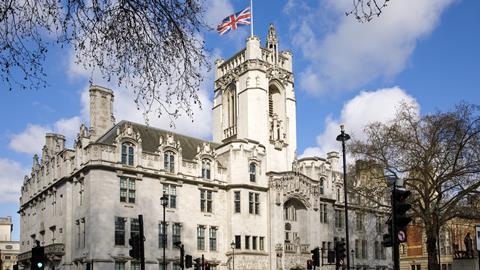The Supreme Court ‘firmly shut the door’ on a £3bn data protection claim against Google today, but left open the possibility of using representative actions in similar cases, lawyers have said.
A representative claim against the tech giant for alleged breaches of the Data Protection Act 1998 was ‘doomed to fail’, the UK’s highest court said as it refused permission to serve proceedings on Google outside of the jurisdiction.
The proposed claim on behalf of more than four million iPhone users in England and Wales – whose personal data was said to have been ‘illegally misused’ by Google – is now ‘effectively’ at an end, representative claimant Richard Lloyd told the Gazette outside the Supreme Court.
But he said the court’s ‘endorsement’ of the use of the representative procedure under CPR 19.6 ‘will mean that other claims will still be able to come forward’.
Liz Williams, who is seeking to bring a representative data protection claim against credit reference agency Experian on behalf of around 40 million people, told the Gazette that the ruling ‘doesn’t change things for us’. ‘The court was very clear today in indicating that they need evidence and we believe we have a lot of it,’ she said.
David Greene from the London Solicitors Litigation Association agreed, saying the Supreme Court’s decision ‘leaves open the question of whether a claim could be brought under CPR 19.6 in similar circumstances', either for a 'common declaration or where individual damages can be proved'. ‘The door is shut in this particular case but left ajar for innovative use of this age-old provision,’ he added.
David Barker, a partner at Pinsent Masons who represented Google in the Lloyd case, said the ruling was 'a very positive development for data controllers of all sizes’. He suggest that it ‘now seems unlikely that litigation funders will have any appetite’ to pursue similar representative data protection claims.
Mark Young, a partner in the data privacy team at Covington, said the Supreme Court had closed the door on this particular claim, but added: ‘That doesn’t mean we won’t see consumers trying to bring class actions alleging breaches of their privacy in future, however – this decision is likely only to be the beginning in this hotly contested area.’
Both Philip Tansley, a partner at Shoosmiths, and Richard Beaty, an employed barrister and data protection expert at Kennedys, said businesses will be breathing a ‘sigh of relief’ today. Beaty said low-value data protection claims were ‘in danger of becoming the new pre-tariff personal injury whiplash-type claims, but this judgment should help to stem the tide of litigated claims’.
Tansley said that, if the appeal was dismissed, ‘it would lead to a tidal wave of claims, not just against the tech giants but a lot of ordinary businesses who had suffered data breaches or had inadvertently breached data laws in other ways’.
But the court did not reject the possibility of claims ‘where consumers could provide evidence of financial loss or distress’ Tansley added, predicting that claimant firms might ‘look at bringing claims of this sort in two stages, by first seeking a declaration that the defendant is liable and then resolving quantum via a second set of hearings – or more probably agreeing a settlement’.
The Supreme Court’s decision also prompted calls for the government to legislate. Rocio Concha, director of policy and advocacy at Which?, said: ‘The government must allow for an opt-out collective redress regime which would mean that affected victims would be automatically included in the action and be represented by a body bringing the claim on behalf of those affected.’
Lloyd’s solicitor James Oldnall, managing partner at claimant firm Milberg London, described recent successes in certifying collective proceedings for alleged breaches of competition law as ‘exciting’ and ‘a good news story for consumers’.
He said the government had turned down ‘the opportunity’ to introduce collective action procedures for data protection claims ‘because we’ve got Lloyd v Google’. ‘Well, now we don’t so it’s really back to them to sort it out’, he added.






























5 Readers' comments